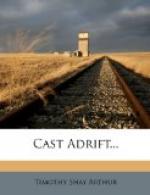“They make ten hits up there to one at Sam McFaddon’s,” said Jerkin, again twitching his thumb over his shoulder. “It’s the luckiest office I ever heard of. Two or three hits every day for a week past—got a lucky streak, somehow. If you go in anywhere, take my advice and go in there,” lifting his hand and twitching his thumb upward and over his shoulder again.
The two girls passed from the room, and the door was shut and locked inside. No sooner had they done so than Jerkin made a new examination of the articles, and after satisfying himself as to their value proceeded to put them out of sight. Lifting aside a screen that covered the fireplace, he removed from the chimney back, just above the line of sight, a few loose bricks, and through the hole thus made thrust the articles he had bought, letting them drop into a fireplace on the other side.
On leaving the room of this professional receiver of stolen goods, Pinky and her friend descended to the second story, and by a door which had been cut through into the adjoining property passed to the rear building of the house next door. They found themselves on a landing, or little square hall, with a stairway passing down to the lower story and another leading to the room above. A number of persons were going up and coming down—a forlorn set, for the most part, of all sexes, ages and colors. Those who were going up appeared eager and hopeful, while those who were coming down looked disappointed, sorrowful, angry or desperate. There was a “policy shop” in one of the rooms above, and these were some of its miserable customers. It was the hour when the morning drawings of the lotteries were received at the office, or “shop,” and the poor infatuated dupes who had bet on their favorite “rows” were crowding in to learn the result.
Poor old men and women in scant or wretched clothing, young girls with faces marred by evil, blotched and bloated creatures of both sexes, with little that was human in their countenances, except the bare features, boys and girls not yet in their teens, but old in vice and crime, and drunkards with shaking nerves,—all these were going up in hope and coming down in disappointment. Here and there was one of a different quality, a scantily-dressed woman with a thin, wasted face and hollow eyes, who had been fighting the wolf and keeping fast hold of her integrity, or a tender, innocent-looking girl, the messenger of a weak and shiftless mother, or a pale, bright-eyed boy whose much-worn but clean and well-kept garments gave sad evidence of a home out of which prop and stay had been removed. The strong and the weak, the pure and the defiled, were there. A poor washerwoman who in a moment of weakness has pawned the garments entrusted to her care, that she might venture upon a “row” of which she had dreamed, comes shrinking down with a pale, frightened face, and the bitterness of despair in her heart. She has lost. What then? She




